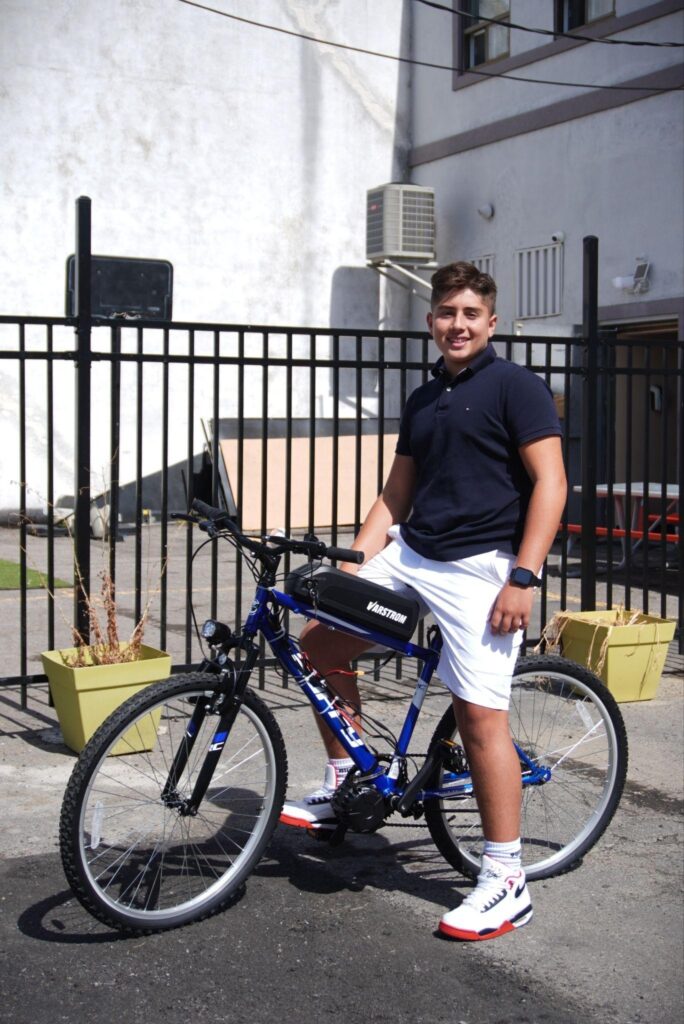By Matthew Daldalian, Local Journalism Initiative Reporter
The future of cycling infrastructure is already here for one Laval teen – Video by Matthew Daldalian
Streets in the greater Montreal area are changing. Bike lanes continue to expand, more BIXI e-bikes are finding themselves in street corners, and debates over cycling infrastructure keep dividing residents. While critics say the changes squeeze already-congested roads, supporters argue they mark a step toward cleaner, more sustainable transportation.
For 15-year-old Marc-Anthony Mourad, that future is already here.
Childhood Hobby
Over the summer, the Laval Senior Academy student dedicated himself to building e-bikes and showing other kids how to do the same, running workshops that turned regular bicycles into battery-powered rides.
“I was always into those kinds of things, you know, mechanics and electricity,” Mourad said. “I would always watch videos on electric bikes. I was like ‘man, I wish I had one’.”
The idea combined his childhood hobby of tinkering with power tools alongside his grandfather with his fascination for electric vehicles. He designed the bike to run on drill batteries and presented it as a project for the Hydro-Québec Super Expo-Science competition back in April.
His entry tied into five United Nations sustainability goals, from clean energy to sustainable cities, and he documented the process on his YouTube channel Marco E-Rides.
That work caught the eye of Tami Belhadj, Director of Club Techno at the Centre Lavallois de Ressources Éducatives et Culturelles (LREC).
“He actually made an e-bike by himself […] he was very autonomous, and I was really impressed with his work,” Belhadj said. “So, I invited him to come to Club Techno and we discussed: ‘can you teach other kids to do what you did?’”
The eager Mourad agreed. Over the summer, he ran workshops where participants— some younger than him, others older— built e-bikes using conversion kits. He prepared theory lessons, step-by-step slides, and even played instructional videos from his YouTube channel as students followed along.
Building Bikes
With grant funding, the centre purchased Walmart bicycles and online motor kits. Over several weeks, the workshops produced five functioning e-bikes.
“By turning a traditional bike into an e-bike, they understand the ins and outs of this technology,” Belhadj said. “Hopefully it gets them to think about career opportunities in these industries in the future.”
The next step, Belhadj added, is to build a solar charging station so the bikes can be borrowed and returned like a “BIXI-type service.”
The LREC’s Club Techno, organizes technology workshops, environmental projects and summer programs for local youth. Belhadj’s past initiatives have ranged from composting and eco-houses to hands-on STEM activities, all aimed at linking education with sustainability.
For Mourad, the project was as much about inspiring others as it was about building machines. “When you have an idea, put your mind to it and don’t stop until you get there,” he said.

Teen engineer Marc-Anthony Mourad sitting upon one of the e-bikes built by participants of the summer e-bike workshops outside the Centre Lavallois de Ressources Éducatives et Culturelles (LREC) (Photo: Matthew Daldalian, Newsfirst Multimedia).
E-bikes and Infrastructure
Experts say e-bikes like Mourad’s are transforming how people move through cities.
“[E-bikes] allow you to cover longer distances with less effort,” said Ahmed El-Geneidy, professor at McGill University’s School of Urban Planning. A regular cyclist might travel five or six kilometers in a day, he explained, but an e-bike doubles that, opening access to jobs, groceries and other opportunities without relying on a car.
El-Geneidy said Mourad’s approach— converting traditional bikes into electric ones— could make the technology accessible to more Montrealers. “If we have someone here who can commercialize it and sell it in Montreal, that will put us ahead of many places around the world,” he said.
But challenges remain. Store-bought e-bikes can cost between $3,000 and $5,000, making them a target for theft. Montreal’s cycling infrastructure also lags behind demand, according to El-Geneidy, with faster e-bikes and scooters sharing space on narrow bike paths. “We need to expand our bicycle network and make sure that we have enough space for cycling in general,” he said.
Still, Mourad is convinced electric vehicles are the path forward, with home-built models replacing gas alternatives. “If we continue on this path, our world will become a lot cleaner and we’ll have a more sustainable future,” he said.
For now, though, he’s focused on finishing secondary school, applying to CEGEP, and slowly but surely working on his next invention.



